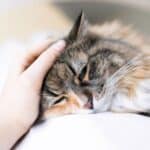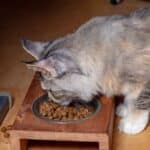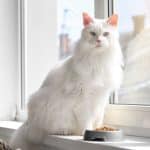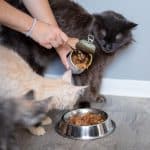Your feisty feline can become even feistier when they are hungry. They want their food when they want it and that is all there is to it. However, cats cannot eat too much human food. Some foods need to be cooked and will be okay to feed your gorgeous cat, but most are not safe.
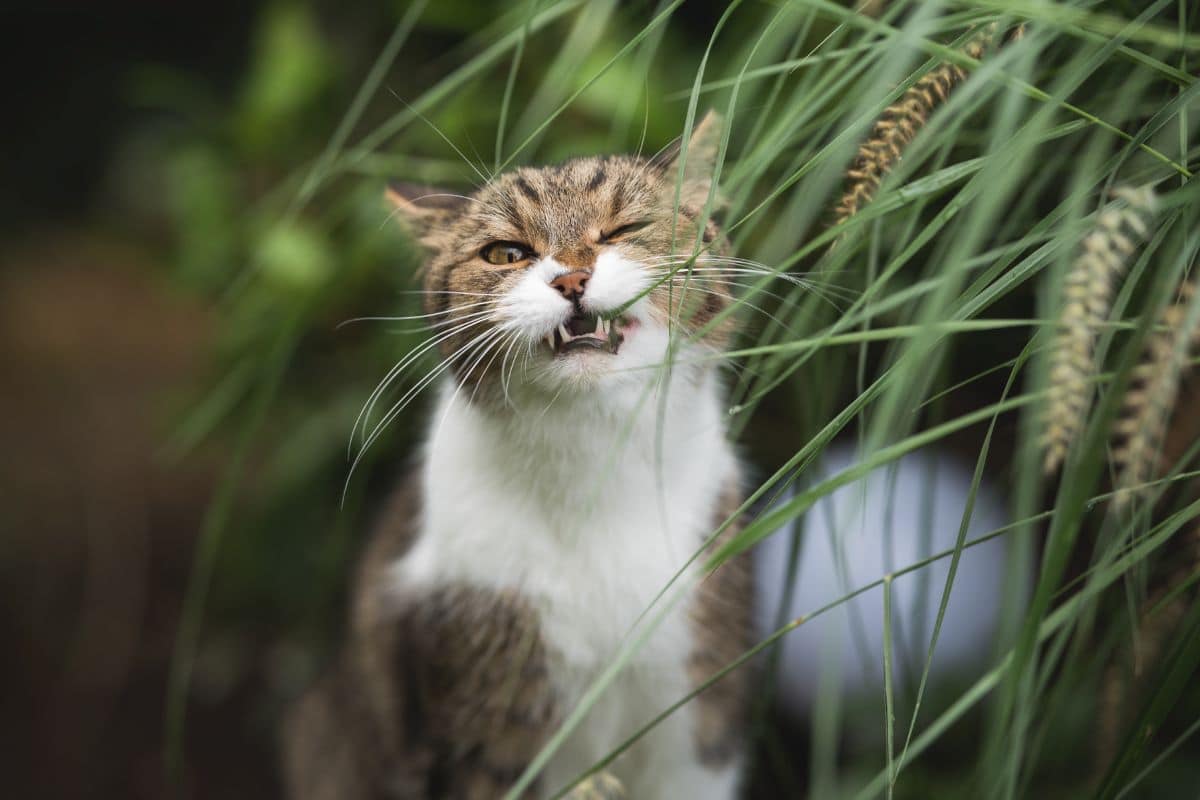
Cats are not just feisty when it comes to eating, they are finicky. They want certain foods. For example, my cat will not eat if I purchase a brand other than what she is used to. She doesn't care how long she goes without eating, she will not eat certain brands.
It is somewhat similar to a well known story of the cat who refused to eat, but when given a can of tuna fish, the cat ate the whole thing and became extremely sick. This case may be an extreme situation. Eating tuna can lead to mercury poisoning. I would have to venture a guess that we do not know the whole story of the cat who got sick from tuna.
A cat’s stomach and digestive tract are obviously not the same as a humans. For this reason, the foods can not be the same. To be safe, we should always stick with approved types of foods when you feed your cat. The vet for your maine coon can advise you on what is the best type, whether it should be soft or crunchy
Jump to:
Let’s look at some of the foods that your cat cannot eat and why.
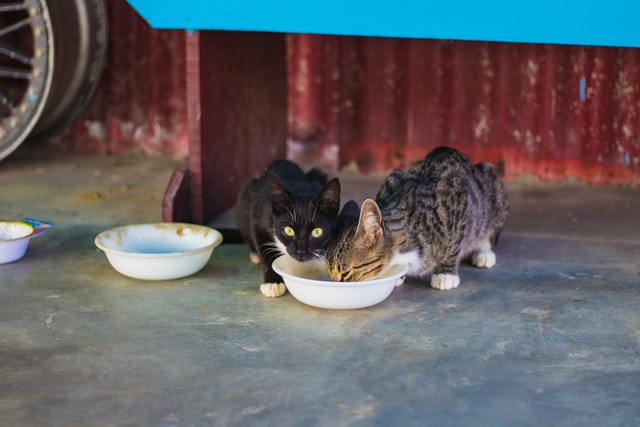
- Alcohol is the first to mention here. Any drink or food that contains alcohol is bad for your cat. Alcohol can cause vomiting, diarrhea, breathing problems, coma or even death.
- Onions, shallots, garlic and scallions should never be given to a cat to eat. Each of these can cause damage to the red blood cells and lead to anemia. These foods can be toxic to your feline when eaten in large quantities, but if eaten in a condensed form such as garlic powder or soup base, they can be even more toxic.
- Raw eggs, raw food meat and bones are another not bright option for your Maine Coon or other cat. There was a time when people were told that raw eggs would give the animal a shiny coat. Those days are no more. The obvious reason would be Salmonella, or e-Coli. Symptoms of this would be vomiting, diarrhea, lethargy. Bones can be extremely dangerous to any animal, but especially cats with such a small mouth, the bones can become lodged anywhere from the throat to the digestive tract.
- Chocolate or caffeinated beverages are poisonous for dogs, that is well known. However, it is just as poisonous for cats. Chocolate contains methylxanthines. These can and will likely cause vomiting, diarrhea, body tremors, high body temp, increased thirst, seizures and an abnormal heart rate. When it comes to animals, although dark chocolate is recommended for humans, dark chocolate is even more dangerous for a cat.
- Citrus fruits contain essential oils and citric acid. Neither is safe for a cat. A small amount may only give your feline a stomach ache, larger quantities can lead to digestive issues like vomiting, diarrhea, and a central nervous system depression. The skins, peels, seeds are all included in the danger zone for cats.
- Dairy, contrary to popular thinking, is not safe for cats. Personally, I grew up on a farm where the cats drink milk straight from the cow and our cats. Many cats are lactose intolerant. Their tummy can not process dairy. You can ask your veterinarian if there is a lactose free version he or she recommends. Digestive issues could plague a cat with stomach problems due to the fact that the only lactose a cat will normally have is when they are nursing from their mother. Once they are done nursing, there is seldom any chance for the cat to have it.
- Tuna is one that it appears every cat loves, since it is fish. However, the cat could suffer from mercury poisoning if they eat too much canned tuna. A little tuna once in a while does not hurt a cat, as long as it is kept to a minimum.
- Grapes and raisins are fruits that need to be banned from around cats and dogs. Even a small amount can make your cat extremely sick. It has not been determined why, however, cats or even dogs eating raisins will lead to rapid kidney failure in the animal. Within 12 hours of eating these fruits, stomach pain, nausea, vomiting and diarrhea. Lethargy, reduced appetite and decreased urination follow soon after. Early signs of this problem will show by hyperactivity and repeated vomiting.
- Xylitol is a common sweetener found in many products today. Generally in candy and gum, when a pet eats this it will lead to vomiting, lethargy and liver failure. Highly poisonous to cats.
- Salt, spices and herbs can also be harmful to your feline baby. Garlic will not only cause stomach upset but will also lead to urination problems and kidney problems. If you see your cat has left some very dark orange to red urine in the litter box, you will need to contact the vet as quickly as possible.
These times of stress, pandemic and having too much to do on our plates everyday do lead to forgetfulness in humans. We may tend to forget to grab cat food for our cat while at the store. You may run out during a terrible blizzard, none of those excuses will satisfy your cat though.
When they are hungry they want to eat. Are there any foods that would be safe to feed the cat on an emergency basis? Let’s look and see what the experts say.
Some of the options you could look to would be to order food from an online supplier, it would be delivered to your door. You could hire a shopper to go to the local market or vet clinic and pick up the cat food for you and bring it to you.
When it comes down to it, there are emergency foods that you can feed to your cat for those times that you cannot get to the store or your cat is refusing to eat.
Before you take food from the refrigerator, ask yourself these three questions first
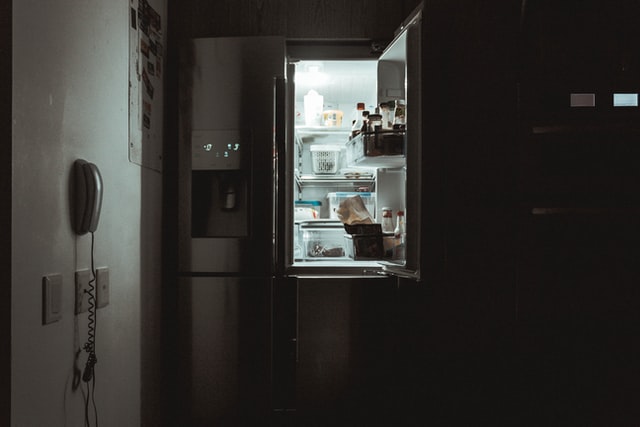
- How much salt is in this food? Or too much fat? Both of these will cause excessive thirst and stomach problems for your cat.
- Does my cat have any allergies or sensitivities that will be affected by the food?
- Is it on the list of toxic or poisonous foods for the animal?
If you do not know the answers to these questions, find a different food. Check the lists you can find online in regards to prohibited foods for cats. Your cat may be hungry, but it is better for you to be safe than regretting the quick grab from the fridge to feed the cat.
In an emergency, you can feed your cat fresh chicken, or lamb as long as there are no preservatives. Personally, I would boil up the meat first just to be on the safe side and not give your cat a food borne illness. Lean pieces of any cooked meat, as long as it is not spicy or loaded with preservatives.
You can cook up some eggs and feed it to your cat, but they need to be cooked. Cheese may fill in as a substitute in an emergency. Plain Greek yogurt, if your cat will take it. Small cooked or steamed vegetables such as carrots, peas, broccoli as long as they have been cooked thoroughly and are soft enough for the cat to eat.
Conclusion
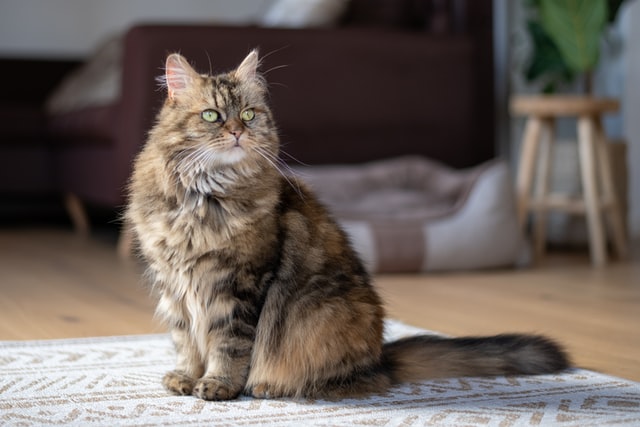
It is understandable to forget one in a while, if you can, it is also helpful to pick up some canned cat food for emergencies. This is good for quite some time as long as it is unopened. So store it and you will always have some for an emergency day or two.
No matter how much your cat asks for it, avoid the foods that have been listed as dangerous. It is cute to watch cats drink milk, but it definitely is not cute to watch the fur babies become sick. Your cat is your family, you love it and should treat it as you would expect to be treated if need be.
Even in tough times, if you make the effort to plan ahead and store food, even if you do not need it right now, an extra bag of food, a pack of canned cat food, at least you will have it and you will not be needlessly worrying over how to feed your baby.

